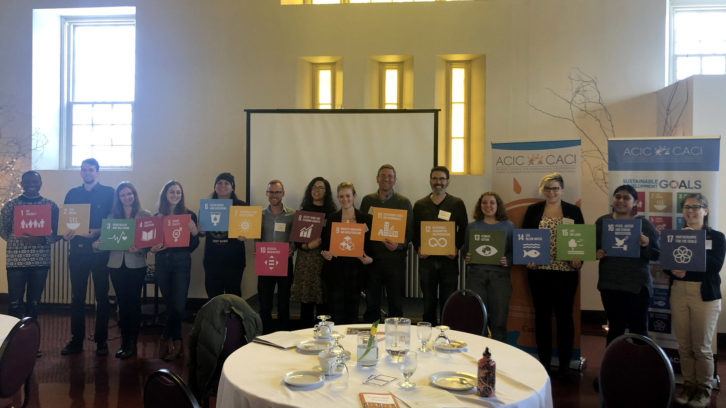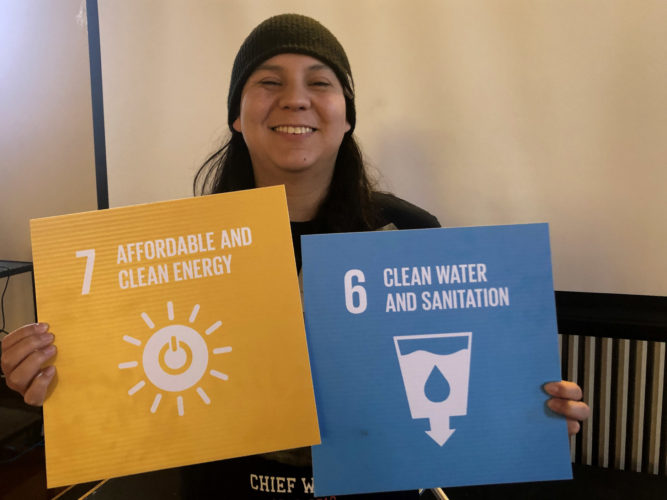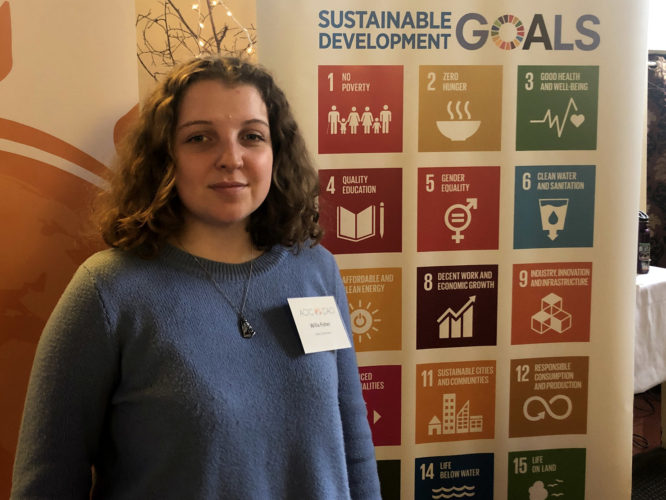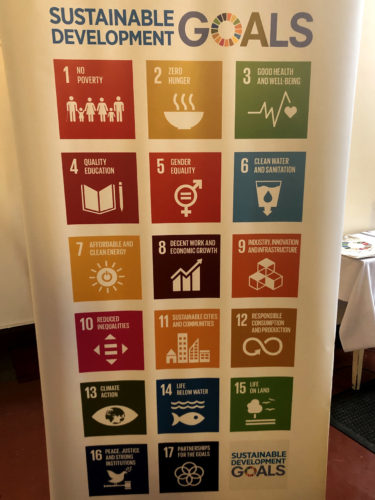Halifax ‘human library’ highlights how people are improving the world
The Atlantic Council for International Cooperation debuted the library to raise awareness for sustainable development

caption
Stacey Gomez was one of the "books" at Thursday's event.Dozens of people sat down to leaf through some “books” at a human library at Dalhousie University on Thursday.
The human library had 16 people who each represented a book people could “take out” and talk to.
The Atlantic Council for International Cooperation’s (ACIC) hosted the event for International Development Week.
The international development theme this year was “go for the goals,” which refers to the United Nations’ 2030 agenda for sustainable development. The agenda is made up of 17 sustainable development goals, or SDGs.
Each person who represented a book was someone who actively supports one of the 17 SDGs.
There were three rounds of 10 minutes where attendees sat down at a table with a human book and asked them questions or discussed the SDG they represented.
“In 10 minutes, you kind of want to get out the questions that might be on the tip of your mind. There’s almost an urgency,” said Martine Panzica, the ACIC provincial co-ordinator.
The idea behind human libraries is to create a safe, accessible space for readers to ask questions and discuss the “book’s” topic.

caption
Group photo of some of the “books” holding the SDG they represent.Stacey Gomez was one of these books. She was there to represent the 16th UN goal: peace, justice and strong institutions.
Gomez is a co-ordinator for the Maritimes-Guatemala Breaking the Silence Network. The network works to support Guatemalan efforts for political, social and economic justice.
“Guatemala lived through an internal armed conflict for 36 years. That ended with the signing of peace accords,” she explained.
Gomez said there are people who continue to seek justice for the acts that occurred, including massacres, genocide against Indigenous peoples, sexual violence and disappearances.
She said when she thinks of people seeking justice in Guatemala, she thinks of a quote by Guatemalan Nobel Prize-winning poet-diplomat Miguel Ángel Asturias: “The eyes of the buried will close [together] on the day of justice.” Gomez thinks the quote is true for many Guatemalans.
The justice Guatemalans are seeking is both legal and about having the right to certain choices, she said.
“Just like in Canada, I would say in Guatemala, there is a big issue of Indigenous people and their voice not being respected in terms of extractive projects like Canadian mining,” said Gomez.
She said people want the right and respect to say yes or no to these projects.
Gomez wasn’t the only one whose work was rooted in Canada, but representative of another country.

caption
Brennan Googoo holding the SDG tiles he’s worked with.Brennan Googoo is a Mi’kmaw youth leader from Nova Scotia’s Millbrook First Nation. In December, he returned from Kenya, where he had been educating people about clean water and sanitation.
“I lived there for four months. We went to 17 different schools,” said Googoo.
They taught younger children the basics of clean water. For the older ones, they taught them how to treat and sustain water.
In Kenya, Googoo lived on a farm with one power outlet in each room. The energy came from solar energy and a turbine. But he said this was considered high-end — a lot of people there live without electricity.
He said for the people he met, if the water was clear, it was considered clean, a false belief largely due to a lack of education.
“Education was limited, first and foremost. Access to education was a big challenge there. And access to quality education on top of that was another challenge,” said Googoo.
He said Christianity heavily influenced the schools there because of colonization.
“Kenya is basically like Canada a couple of generations ago. You see that influence in society all over,” he said. “Especially around things like mental health, it’s just non-existent. Gender equality, non-existent.”
The other issue facing education in that country is the political climate.
“The first issue you would have to tackle is corruption in the political system, which trickles down to corruption in the education system,” explained Googoo.
He said politics contributes to which schools get what kind of funding and who gets to go where.
Googoo was paired with number six and seven of the SDGs: affordable and clean energy and clean water and sanitation.

caption
Willa Fisher standing next to the list of SDGs.Willa Fisher, 17, was the youngest “book” in the human library. She is involved in organizing climate strikes and education along with her friend, Julia Sampson, and several other students.
In September 2019, 10,000 people flooded the streets of downtown Halifax during a climate strike Fisher and her classmates organized.
Fisher said they had no idea that many people would show up. They were hoping for 2,000. She said when they saw the hordes of people, they were shocked.
“Julia just started crying, and I was in shock. And we couldn’t even imagine that would happen,” recalled Fisher. “I went up on this little hill, and I turned around, and I couldn’t see the end of the line. I just had no idea. It was crazy.”
Fisher said when she saw other strikes happening across the world, she and Sampson felt for the first time like they could make a difference.
“This is the right thing to do at this time because it’s such an urgent issue,” she said.
“We don’t have time to go and become environmental lawyers or anything like that, because it takes so long and by the time we get there we’re probably going to hit three degrees of warming.”
Fisher’s group mostly follows the global strike schedule. They also give presentations and provide education to other youth.
She said she’s amazed to see how big this movement has become. Through social media, she talks to other climate strikers across Canada and around the world. They discuss their frustrations and give advice on organizing strikes.
“We just have to get bigger and more intense as time goes on in relation to how the government is acting on the climate crisis,” said Fisher.
She represented SDG number 13: climate action.

caption
The 17 SDGs.Janelle Frail, the ACIC development and training officer, said they heard from a staff member who attended a human library in Vancouver and expressed how much they enjoyed the experience.
“A lot of people work on different things or in different themes, but don’t realize that it’s connected to the SDGs. More and more people are realizing that,” said Frail. “I think that all social justice work or community development work you can connect to an SDG.”
Frail said they hope to host another version of the event sometime in the future.
Gomez said all the speakers, or books, acted as different entry points into the SDGs. She believes the people in attendance showed how many people are working towards those goals.
“We don’t always frame our work in terms of working towards the SDGs, but it is really powerful to see that they are contributing more broadly in that way,” said Gomez.
About the author
Kristina Pappas
Kristina Pappas is a journalism student. She's from western Canada and is smitten with the east coast's charm. You can find her at a beach, exploring...
